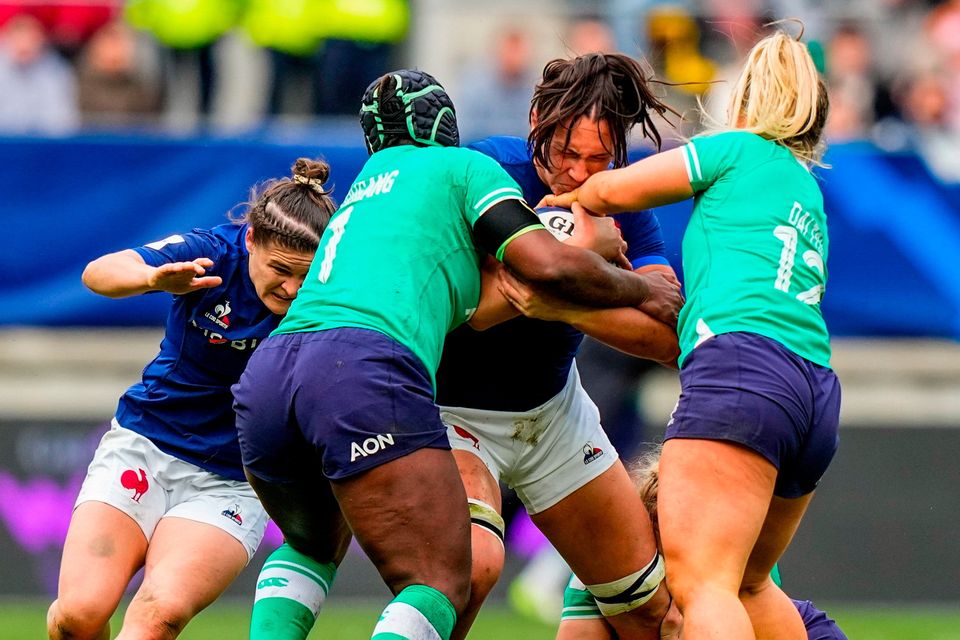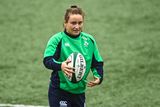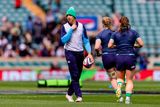‘It’s an amazing challenge’ – New women’s coach Declan Danaher already making case for defence
Manaé Feleu of France is tackled by Linda Djougang, left, and Aoife Dalton of Ireland during the Women's Six Nations match at Stade Marie-Marvingt in Le Mans, France. Photo by Hugo Pfeiffer/Sportsfile
Ireland defence coach Declan Danaher has done a fine job making a first impression.
The former London Irish assistant coach is over a month into his new role with the national women’s squad and already his work is becoming a point of difference.
The Irish defence was the most encouraging aspect of their game against France in the Women’s Six Nations. Even Aoife Dalton’s post-match words that Danaher has developed a love for defending among the players was an impressive testimonial.
Let’s look at the metrics. Ireland conceded 53 points to France last year, they reduced it to 38 last Saturday. They conceded nine tries to France last year, they reduced it five last Saturday. They missed 43 tackles against France last year, they reduced it to 17 last Saturday.
There’s also the incalculables like the effort, cohesion and pride on show in their defensive game that set this performance apart from last year’s.
When Danaher was asked yesterday what the most important statistic is for him as defence coach, he barely missed a beat. Is it tries conceded? Is it the number of line-breaks by the opposition team? Is the number of tackles made or missed?
“Points conceded. And then the reasons behind why we’ve conceded those points. It’s like a paper trail, isn’t it? So, there will be reasons why and it tends to be no one individual, it tends to be a system or a group error or it could be fatigue, but that’s always what’s interested me, forensically going back,” Danaher explained.
“A lot of people will see the score happening but it’s maybe two phases before, how we set up at the lineout, so I’ll use that information then to try and figure out why, and obviously then try to get that across to the girls so that we’re better prepared next time.”
This is Danaher’s first stint coaching a women’s team after he spent 24 years as a player and coach with London Irish where he worked with Declan Kidney. And switching from a club to a national set-up, Danaher – whose father is from Kerry and mother is from Limerick – realised he can’t over-complicate their defensive structure.
“I was reflecting yesterday on things I could have done better in those four weeks and you’re trying to simplify it and amplify it so that you can go out and put in a performance and that the girls understand it, which I think they’ve done.
“They’re hungry to defend, they want to get that, and then it’s adding in the small bits of detail that don’t overload them so they go into the weekend and they’re not thinking anymore, you just want them to go out and flow, whether that’s in attack or defence.
“I just see it as an amazing challenge that’s going to hopefully make me a better coach, and if I become a better coach then hopefully I’m trying to make the girls better as well on the back of that.”
Italy will bring another defensive challenge when they arrive at the RDS on Sunday.
“I think they’re going to come with a lot of intent to move the ball and obviously we’re going to have to be prepared for that and offloads, and on the back of the weekend we’re probably ready to scramble a bit and be prepared for that.
“The better we get our attack, our set-piece, and continue to grow those areas and attack, it probably takes a little bit of pressure off the ‘D’ and we’ve done great work this week. We’re just off the back of a training session now and the attack was pretty tasty.”
So ‘simplify it and amplify it’, according to Danaher. Sounds like a pragmatic baseline from which this team can come into its own.















